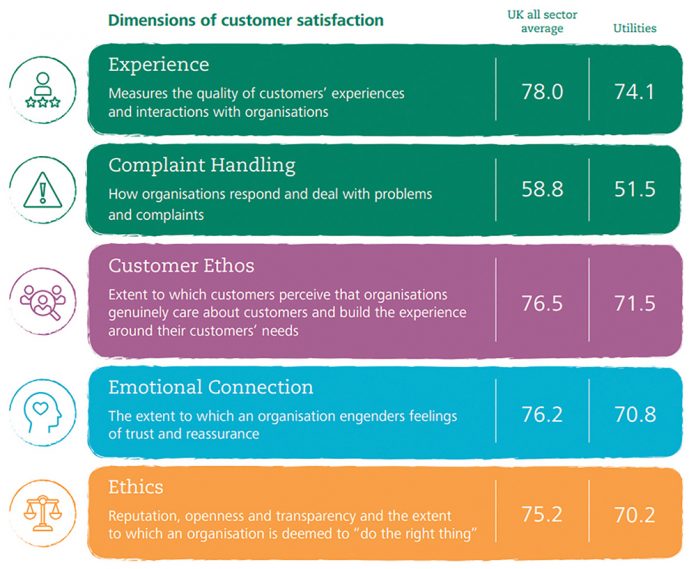The government’s announcements in late September of a raft of new coronavirus restrictions has taken us into a new period of challenge and uncertainty for businesses across the county. The effects of continued economic uncertainty, job losses and increasing numbers of vulnerable customers are set to continue for the foreseeable future – and will have a lasting impact on the customer experience environment, not least for water companies, who have been on the frontline of this crisis since the very start.
As we face these new set of challenges, it is vital that businesses do not lose focus on driving excellent customer service. Our latest UK Customer Satisfaction Index (UKCSI) published in July revealed satisfaction levels have flatlined over the past year. Within the utilities sector, satisfaction levels rose less than a point, in spite of widespread support measures put in place throughout the crisis, and the sector remains the second lowest ranked in terms of customer satisfaction.
Yet despite this flat lining, we have also seen an interesting pattern emerge; a clear polarisation between organisations as customers respond to those who have done well, and those who have not, during the pandemic. There is no doubt that some businesses have responded more effectively to the crisis than others. Those that have maintained a strategic focus on the customer, shown empathy and a focus on doing the right thing and maintained honest and consistent communications have clearly differentiated themselves from competitors. On the other hand, the impact of lockdown has highlighted organisations with weaknesses in their service offering, earning them the ire of frustrated and under-pressure customers that won’t be quickly forgotten.
As we enter the next stage of this crisis, it is vital that water companies do not lose the focus on customer service they have shown throughout the crisis. The past few months have seen inspiring examples of organisations in the sector going above and beyond to support their customers – introducing new measures to protect those in difficult financial or health related circumstances, as well as introducing new innovations to enable them to effectively service customers from afar. I urge organisations not to lose this focus in the months and years to come – not only because it is the right thing to do, but also because it is a sound business move. Customers are increasingly looking to brands to share their values and ethics – with factors such as support for vulnerable customers, doing the right thing by employees and getting involved in local communities all having become more important.
The crisis has also shown the importance of remaining agile, so as to respond quickly and effectively to rapidly changing circumstances. Throughout the past few months, organisations have had to adapt the way they operate in order to cope with reduced team sizes, protect the health of safety of customers and employees, and respond to a sudden surge in demand from vulnerable customers. Those that have embedded service into their culture and values, and remained rigorously clear on their purpose, have seen themselves best placed to respond effectively to the changing needs of their customer base.
There is no doubt the next few years, and even decades, will be challenging – but we must learn from the mistakes of the past. After the last recession, we saw a collapse in customer satisfaction, with an increase of both complaints and the cost to serve customers. With high levels of customer satisfaction intrinsically liked to growth, profitability and productivity – it’s vital that we put service on top of the agenda in order to aid our economic recovery.



